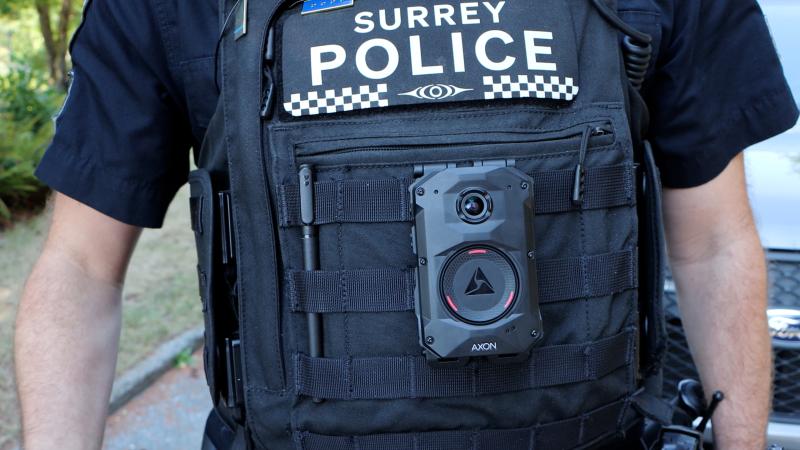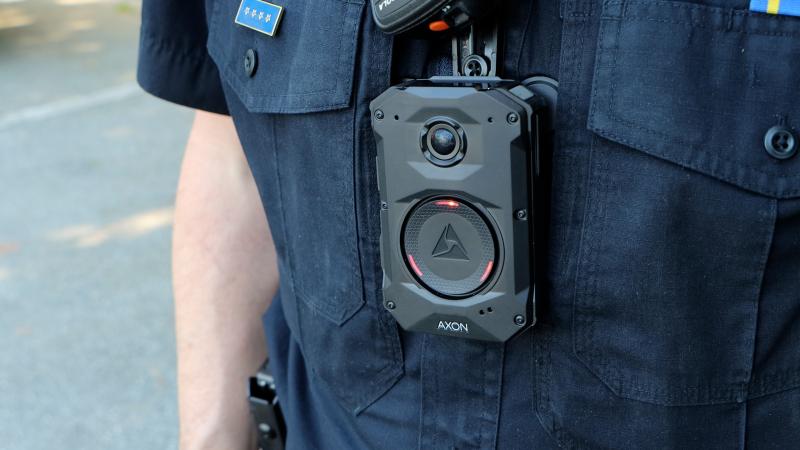Body-Worn Cameras
In October 2025, Surrey Police Service (SPS) launched a six-month body-worn camera (BWC) pilot program to increase transparency and accountability around police interactions with the public.
SPS pilot program
BWCs are used by several Canadian police agencies, including Delta, Vancouver, Toronto, and Calgary. In 2021, SPS began researching and developing its own BWC program. This process included completing a privacy impact assessment, ensuring alignment with provincial policing standards, and developing guidelines for usage. Two community consultations were also conducted which showed strong support for police using BWCs in Surrey (90% support in 2021; 84% in 2024).
In 2024, the Surrey Police Board approved the purchase of 20 BWCs in preparation for the pilot. SPS’s six-month pilot project began in October 2025, with 20 SPS Road Safety officers.
Benefits of body-worn cameras
BWCs provide an independent account of police interactions, and they align with SPS’s commitment to being an accountable and transparent police service. Whether they are used to provide an unbiased account of encounters between police and the public, or to provide evidence in court, BWCs are an important tool.
The use of BWCs will:

- Improve evidence collection and documentation, supporting more successful prosecutions.
- Enhance transparency and trust by providing the public with accountability during interactions with police officers.
- De-escalate the behaviour of individuals who are aware that recording is in progress, which will improve both public and officer safety.
- Help resolve public complaints in a timely manner.
- Provide more insight into police and public encounters, which will inform improvements to police training.
Authority and governance of body-worn cameras
In 2019, the provincial government released a mandatory directive that governs the implementation and use of BWCs by police services (Provincial Policing Standard 4.2.1). SPS is conducting its BWC pilot program in accordance with these provincial regulations, which include police officer training.
You can view SPS’s BWC Directive, which governs the use of BWCs during the pilot.
Use and activation of body-worn cameras
SPS officers with BWCs will record the entirety of all investigative and enforcement activities, including at calls for service, and when capturing evidence, executing search warrants, and interacting with the public during the lawful execution of police duties.
At their earliest opportunity, police officers will inform members of the public they are interacting with that the BWC is recording, ensuring the flashing red light on BWC is visible, if operationally possible.
Privacy and recordings
SPS understands that the use of BWCs can have significant privacy implications. Officers always balance the law enforcement objective against possible privacy concerns. Officers must also carefully consider the use of BWC in locations where heightened privacy concerns exist such as homes, health care facilities, places of worship, etc.
BWCs will not be used for continuous or indiscriminate recording and officers will tell members of the public when they are being recorded, at the earliest opportunity,
SPS completed a Privacy Impact Assessment for the use of BWCs and developed guidelines for the pilot program that are aligned with privacy legislation and BC Provincial Policing Standards.
BWC video is stored in a secure manner with limited employee access. Recordings will be automatically deleted after 13 months, unless required as evidence or for training purposes. BWC recordings retained as evidence in relation to an offence or complaint will be kept for the relevant retention period, in accordance with applicable policing standards.
Viewing the recordings of BWCs is restricted to investigation and training purposes. Members of the public and media, including those who appear in a BWC recording, may request a copy of a recording in accordance with the Freedom of Information and Protection of Privacy Act. SPS may release BWC recordings to the public and media where a “compelling public interest” exists, however recordings cannot be released in any case where the Independent Investigations Office of BC has asserted jurisdiction.
Learn more at www.surreypolice.ca/information-and-privacy.
View SPS’s BWC Directive, which governs the use of BWCs during the pilot.

Frequently Asked Questions
How will I know if the camera is on?
Officers will wear the BWC on the front of their carrier. During the pilot, only 20 SPS Road Safety officers will use BWCs. They will activate recording during interactions with the public when the nature of the interaction becomes either investigative or enforcement related. Officers will, at their earliest opportunity and if safe to do so, tell members of the public they are interacting with that the BWC is recording. When the camera is actively recording it will illuminate a red light.
If required for officer safety purposes, officers can use the stealth mode on their BWC in circumstances where the blinking light could reduce the effectiveness of police tactics or put the member or public in danger.
Do you record every interaction with the public?
An officer will start recording on a BWC during the lawful execution of their duties. SPS officers will activate their BWCs in instances such as:
- attending a call for service
- speaking to someone in a police investigation
- assisting in de-escalating a situation
- to capture evidence at a crime scene
- during a traffic or roadside enforcement
- interviewing a witness or suspect
- believing the situation will become violent and use of force may be necessary
Are their circumstances where an officer won’t record due to privacy concerns?
An officer may not turn on their BWC or they may obstruct the lens during sensitive situations such as an individual putting clothes on. If an officer attends an Indigenous ceremony, there will be no recording without express consent of the Elder or Knowledge-Keeper, unless there are exigent circumstances.
Officers will carefully consider the use of BWC where heightened privacy concerns exist in locations and situations such as:
- health care facilities
- places of worship
- where there is nudity
- when children or youth are present
If an officer chooses to stop a recording, they must document their reasons.
Will the officer tell me I’m being recorded?
Officers will, at their earliest opportunity and if safe to do so, advise members of the public they are interacting with that the BWC is recording. When the camera is actively recording it will illuminate a red light. The flashing red light on the camera must be visible by the public, if operationally possible.
If I was recorded, can I access my video?
Recording can only be released in accordance with Part 2 or Part 3 of the Freedom of Information and Protection of Privacy Act. For more information, please contact SPS’s Information, Privacy and Disclosure Unit.
If I was recorded, will it be released publicly?
BWC recordings may not be released to the public or media unless required by law (disclosure to BC Prosecution Service or a Freedom of Information request) or approval has been obtained from the Chief Constable. On rare occasions, SPS may release a recording to the public that depicts interactions with the public where a “compelling public interest” exists. However, recordings cannot be released in instances where the Independent Investigations Office of BC has asserted jurisdiction.
How long are recordings kept?
BWC video will be automatically deleted after 13 months, unless required as evidence or for training purposes. Recordings retained as evidence in relation to an offence or complaint will be kept for the relevant retention period in accordance with applicable policing standards and then deleted.
Will all SPS officers have body-worn cameras?
During the pilot project, only 20 SPS Road Safety officers will use BWCs. Following the conclusion of the pilot, if SPS decides to continue the program, more officers in Frontline operations may be identified and trained to use BWCs.
Why is SPS using BWCs?
BWCs provide an unbiased, independent account of police interactions, and they are an investment in SPS’s commitment to being an accountable and transparent police service. Whether they are used to provide an unbiased account of encounters between police and the public, or to provide evidence in court, BWCs are an important tool.
Benefits of BWC include:
- Improve evidence collection and documentation, supporting more successful prosecutions.
- Enhance transparency and trust by providing the public with accountability during interactions with police officers.
- De-escalate the behaviour of individuals who are aware that recording is in progress, which will improve both public and officer safety.
- Help resolve public complaints in a timely manner.
- Provide more insight into police and public encounters, which will inform improvements to police training.
What is the cost of BWCs?
The cost of the 20 BWCs was $1,050 per unit for a total cost of $21,000, which was approved by the Surrey Police Board. Following the conclusion of the pilot, if SPS decides to move forward with a larger deployment of BWC, we will determine and request the required budget through the Board.
What happens if an officer doesn’t follow procedures or doesn’t record an interaction?
Like any other allegation of misconduct, complaints can be made to the Office of the Police Complaint Commissioner of British Columbia or SPS’s Professional Standards Section. We know that only proper use of BWCs will enhance public trust and legitimacy while improper use will have the opposite, detrimental effect on police/community relations.
Who can access the recorded video? Could someone alter it?
Recorded data cannot be altered or deleted at any time. It can be viewed in real-time by the recording officer. It can also be viewed by the officer and their supervisor once it has been uploaded to SPS’s secure storage location.
Do officers require training to use the cameras?
Yes, officers will undergo a pre-course online and in-person training covering the use, organizational procedures, and technical training on how to operate the cameras and manage the recordings in the Digital Evidence Management System (DEMS).
Can I request an officer to not record me?
You can request that an officer not record you, however officers must weigh the law enforcement objective against the privacy concern and take reasonable steps to gather appropriate evidence and minimize the impact on an individual’s privacy.
